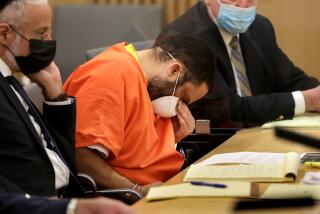Trial in Officer’s Slaying Ends in Hung Jury
- Share via
SAN FERNANDO — Jurors could not agree Monday on an unusual question: Is a man who failed to warn police that a fugitive was nearby responsible for the suspect’s murder of one of the officers?
The hung jury in San Fernando Superior Court was a victory for the defense, which predicted the retrial will end in an acquittal.
“I truly believe that they would have acquitted him” if not for the emotional impact of an officer’s death, said defense attorney Mathew S. Vallance. “I don’t think a conviction will ever be obtained on these facts.”
Glendale Police Officer Charles Lazzaretto was shot to death in May 1997 by a domestic abuse suspect in the Chatsworth warehouse where the suspect worked.
Ronald Davey, 51, had lied to the officers, telling them Israel Gonzalez was not there. Then, on orders of his supervisor, he walked the officers through the warehouse, where Gonzalez shot at them, killing Lazzaretto. Other officers were hurt in the ensuing seven-hour standoff, which ended when Gonzalez, wanted for beating a girlfriend, killed himself.
Eight jurors favored convicting Davey of manslaughter, while four voted for acquittal.
Deputy Dist. Atty. Larry Morrison said Davey is guilty of involuntary manslaughter and being an accessory after the fact because his lie to police led directly to Lazzaretto’s death.
He said police told Davey they were looking for Gonzalez for a violent felony and that he acted with gross negligence by taking them into the warehouse.
“The jurors that voted guilty clearly were satisfied with the evidence and were able to understand the law,” Morrison said. He said he was “extremely disappointed” by the mistrial but is prepared to try the case again. A retrial has been scheduled for May.
Vallance, Davey’s lawyer, said his client had no way of divining what Gonzalez would do. He points out that even Gonzalez’s girlfriend, whom he beat up, said she was shocked to learn that he had shot an officer and killed himself.
“It just wasn’t something that anybody could foresee,” Vallance said. He said Davey lied because “he just didn’t want to get involved.”
He said his client was wrongly prosecuted by authorities who feel the need to convict someone because an officer was killed, but can’t nail the real culprit because he killed himself.
The case illustrates the difficulties in prosecuting people who are peripherally involved in crimes, one legal expert said.
Laurie Levenson, associate dean of Loyola Law School, agreed with Vallance that often these prosecutions rise from the desire to lay blame, such as when police officers kill a suspect, then book his crime partners for murder.
Convictions are difficult in those situations, however. She said jurors are likely to put themselves in Davey’s shoes and wonder how they would have reacted.
“Many people feel very ambivalent about being stuck involuntarily in the middle of a police situation,” she said. “You can absolutely understand why the jury hung. This guy doesn’t really intend for anyone to get hurt. He’s in harm’s way himself.”
Morrison said the case is about society’s slipping values.
“Too many people today think it’s OK to lie to the police, and we hope that this prosecution will help to disavow people of the belief that lying to the police is OK,” Morrison said. “It can have fatal consequences, as it did to Mr. Lazzaretto.”
Both sides said the case may be the first of its kind.
“We looked into it,” Vallance said. “There’s no case similar to this. There’s no precedent.”
More to Read
Sign up for Essential California
The most important California stories and recommendations in your inbox every morning.
You may occasionally receive promotional content from the Los Angeles Times.













